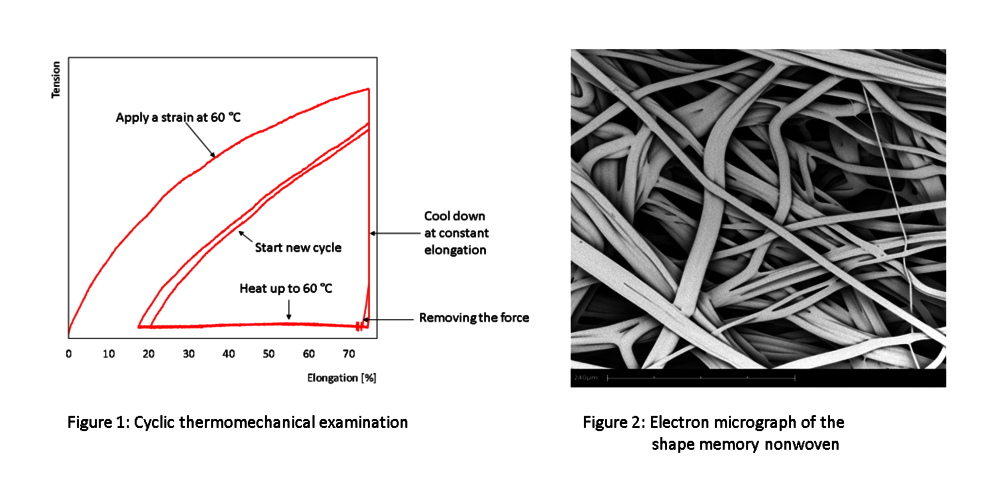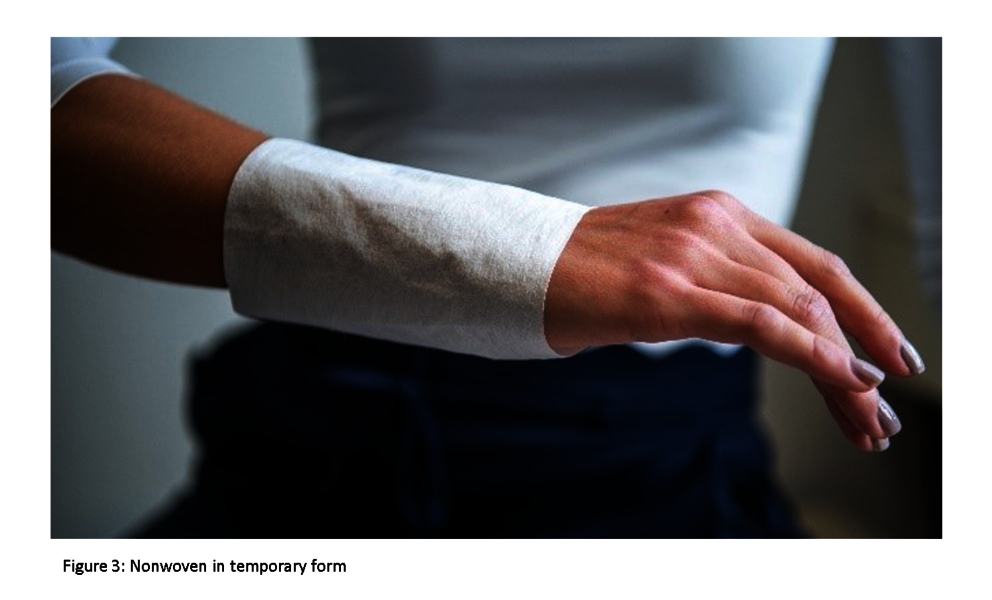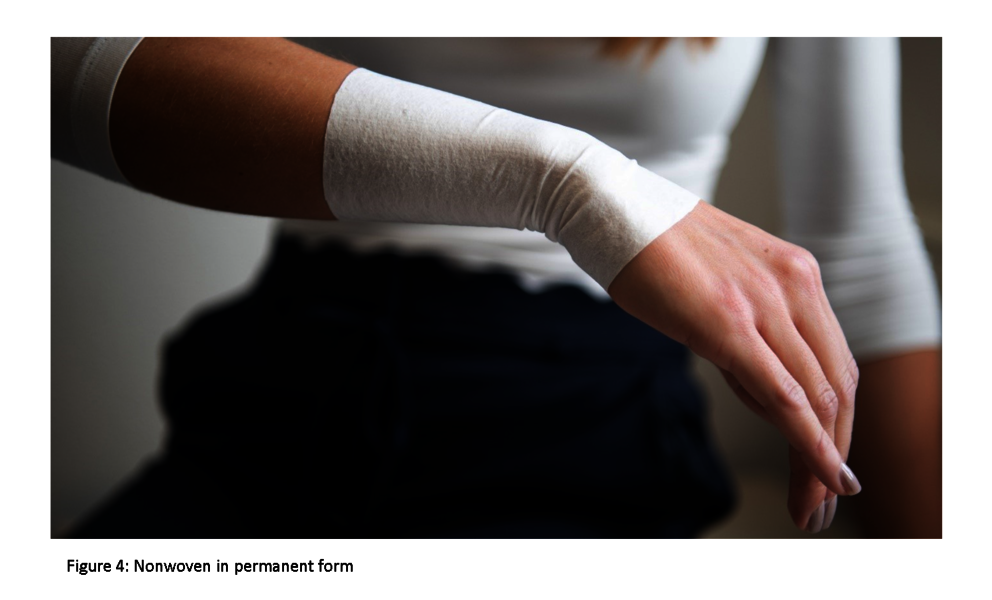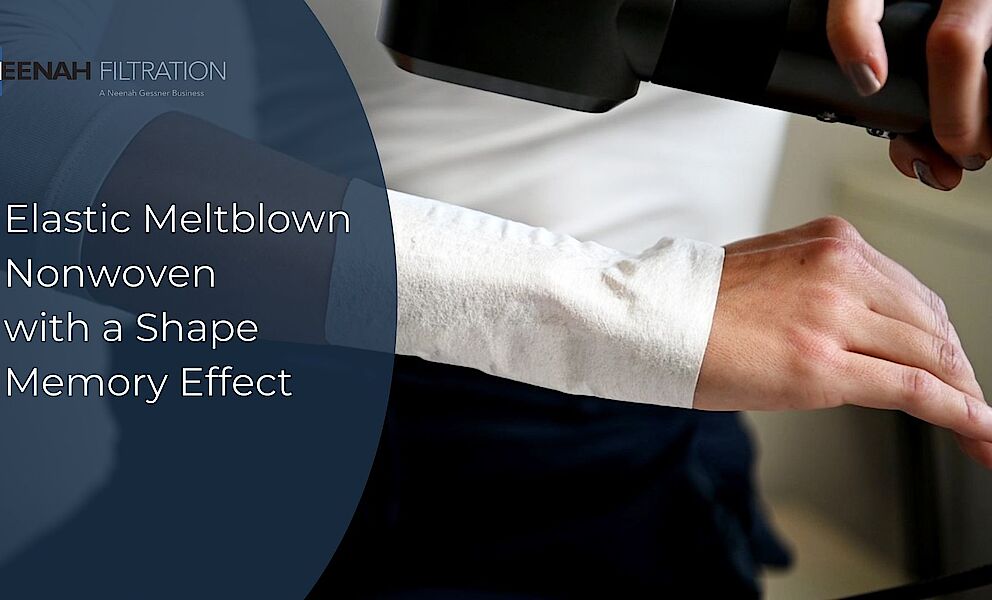"Mass customization" - a megatrend for the future. The individualization of customer requirements is exciting, however, presents manufacturers with continually new challenges. GESSNER and Covestro teamed up to cooperate in product development, for one starting off with a nonwoven having a shape memory effect. The material is manufactured using the meltblown process and is characterized by its ability to temporarily store a structural change until it returns to its original, stored form by means of a temperature increase.
Key to this unique shape memory nonwoven is the base material used, a thermoplastic polyurethane (TPU) with a specially tailored molecular structure. Unlike common TPUs, the plastic has a crystalline soft phase that changes to an amorphous state at about 40-50 °C, allowing deformation at low force. This state is stored by cooling until a renewed increase in temperature leads to a return to the permanent form (cf. figure 1).
In practical terms, this effect means that the nonwoven can temporarily remain in a stretched shape and only shrinks to its original size at temperatures above 50 °C. In addition, the nonwoven has all the properties that generally characterize TPU nonwoven: It consists of fibers with a diameter of about 10 µm (cf. Figure 2), making it highly permeable to air. The material can be produced in a wide range of mass per unit area, which makes it possible to control the strength and the force applied when the material shrinks. It also exhibits elasticity with good recovery even when cold.
The combination of shape memory effect and fibrous structure allows the nonwoven to be used in countless applications. At GESSNER, we are happy to discuss your specific idea and adapt the material to your individual needs. In addition to the properties of the nonwoven itself, it can be combined with a wide variety of other materials. Our lamination technologies allow extensive possibilities to combine two or more layers without losing functions such as air permeability.
Support bandages are an example for an application of the new nonwoven field which we would like to introduce to you at this point. Figure 3 shows the Shape Memory Nonwoven in its temporary form, which was created by stretching at approx. 60 °C and then cooling under tension. It can be loosely pulled over the hand, significantly simplifying the dressing. When heated with a blow-dryer to temperatures above 50 °C, the bandage shrinks as shown in Figure 4. At the same time, it retains its porosity and air permeability, which helps to prevent skin irritation caused by moisture. The elasticity allows for good mobility of the arm.
For years, GESSNER has focused on joint developments, trusted customer relationships and continuous innovation. With nearly 60 years of experience in research, development and production of specialty technical papers and filter materials for industrial and automotive applications, Neenah is one of the leading manufacturers of filtration solutions, as well as an expert in the production of meltblown nonwoven for various applications.
The use of different technologies and raw materials enables us to meet the needs of our customers. Depending on the choice of polymer and additives, we can functionalize our nonwovens with many different properties. Neenah can produce meltblown materials with weights ranging from 25 - 600g/m². Alternatively, meltblowns can be applied directly to a carrier medium, creating combination media in one step.
In addition, many other options are available to customize meltblown nonwovens: Fiber diameter, thickness, basis weight, food compliance, surface design, chemical resistance, heat resistance, compostability, dust loading, UV protection, antibacterial properties, colors and electret charge are some of those.
Our wet-laid lines produce nonwovens and papers, while our meltblown machines produce dry-laid, fully synthetic microfiber nonwovens. Impregnation and coating lines allow us to achieve special properties with water- or solvent-based systems. Our laminating line utilizes various joining technologies and supports the further specialization of our media.
Learn more about our meltblown technology




